Offered in capacities up to 20TB, the Exos X20 is Seagate’s (and the industry’s) highest-capacity 3.5-inch enterprise hard drive. This CMR-based drive is targeted at cloud datacenters where it directly competes with the Western Digital Ultrastar DC HC560. We found lots to like about the Exos X20, including helium sealing, a 2.5M-hour MTBF, and a five-year warranty. But our testing showed it lags noticeably behind Seagate’s own IronWolf Pro 20TB NAS HDD, which we didn’t expect since the drives are practically identical on the hardware side.
Seagate Exos X20 20TB Specifications
The Seagate Exos X20 is effectively the same drive as the NAS-oriented 20TB IronWolf Pro, but offers a SAS 12Gbps interface and other formatting options. Seagate also says that the Exos doesn’t receive the same firmware enhancements for NAS environments that the IronWolf Pro, which causes them to perform differently in that type of testing. (See that review for a more in-depth analysis of the technologies in this drive.)
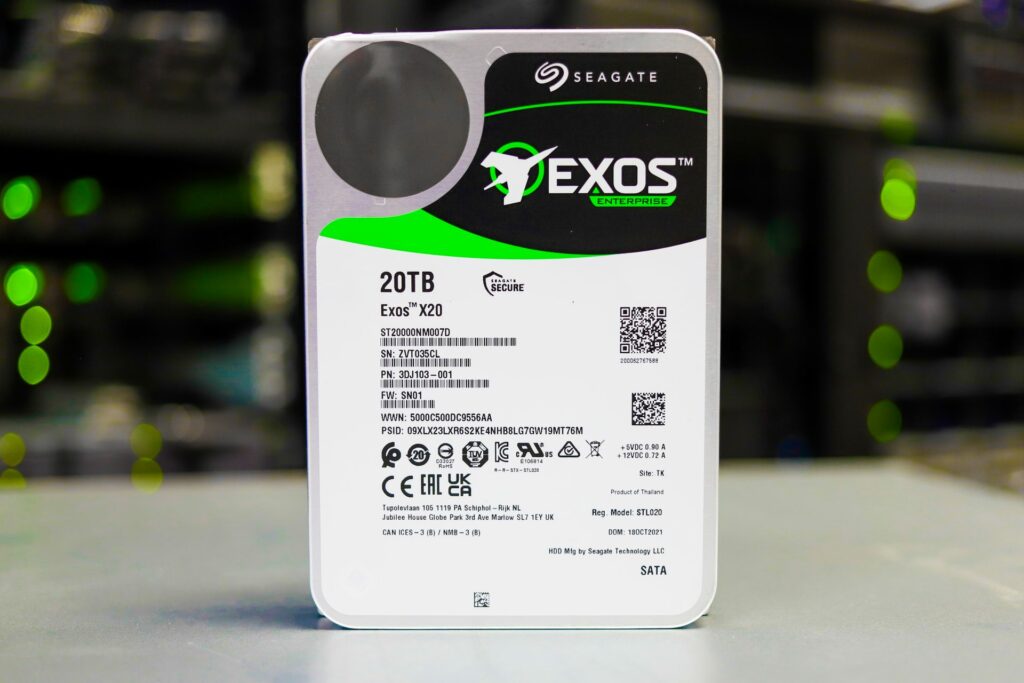
The Exos X20 is available in 18TB and 20TB capacities. It is available as a self-encrypted drive (SED). Seagate rates it for a 2.5M-hour MTBF (double that of the IronWolf Pro 20TB) and a 550TB/year workload. All models are helium-sealed to lower weight and improve performance.
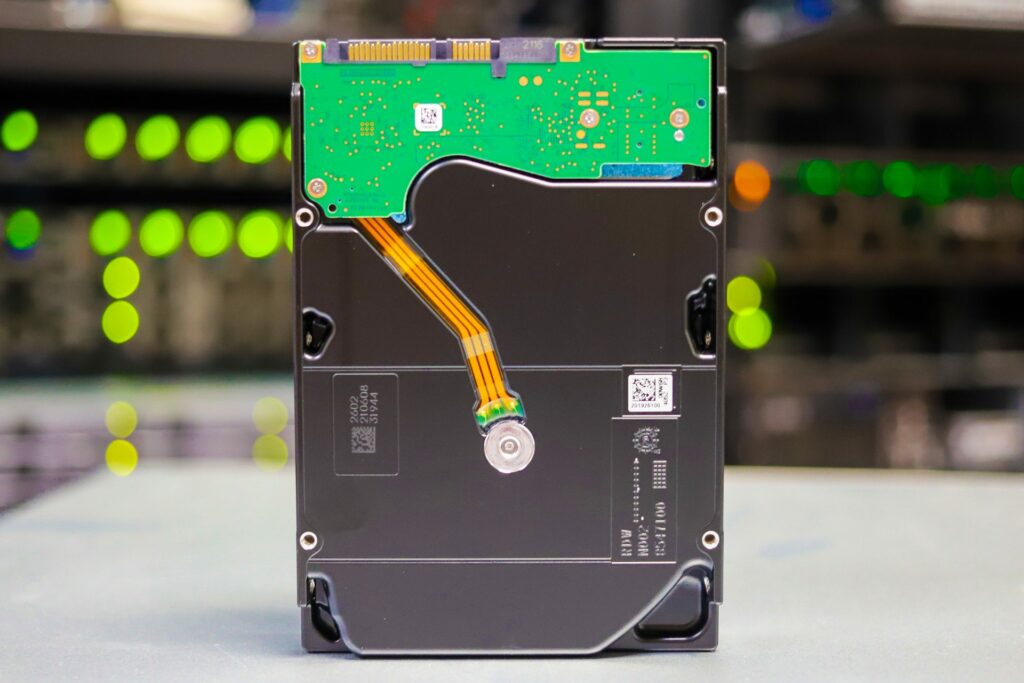
The Exos X20 under review is the 20TB model, which is rated for a sustained data transfer rate of 285MB/s and a low 4.16ms latency. It retails for $669.99. The IronWolf Pro 20TB is slightly less expensive $649.99. While the launch price is higher, market rates for these two families have the Exos much lower. On the 16TB capacity, for example, the IronWolf Pro has a street price of $468, whereas the 16TB Exos sells for $301. This huge price difference will come into play as we look at the performance differences between the two models, which the spec sheet doesn’t really dive into.
The X20 is covered by a five-year warranty, which includes three years of Seagate’s data recovery service. The company claims a success rate of 95%.
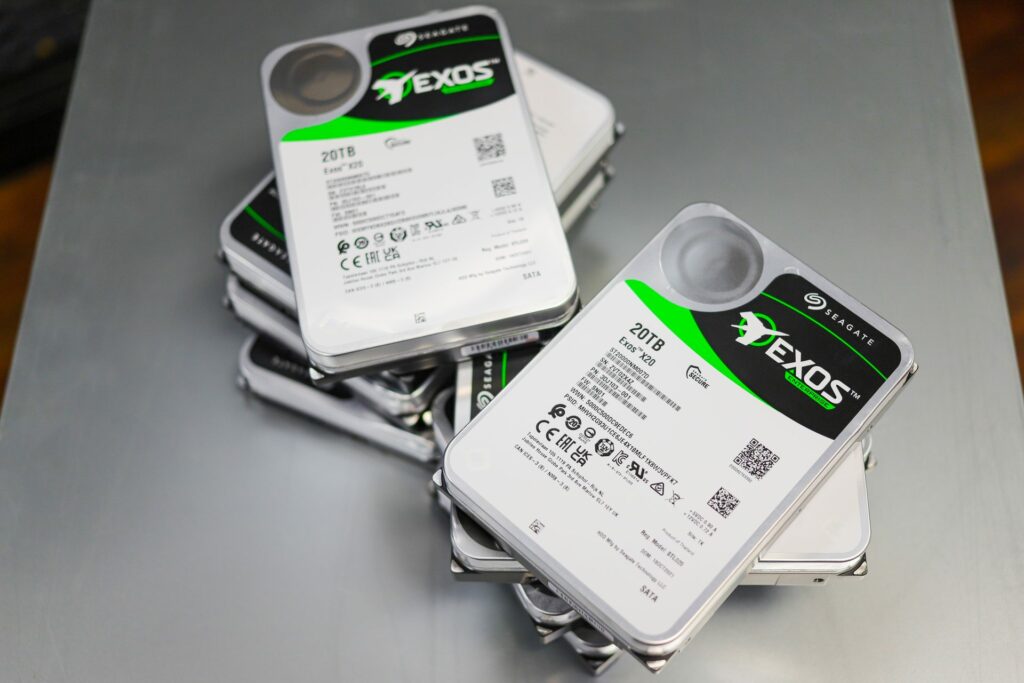
The Exos X20’s full specifications are below.
| Capacity | 18TB, 20TB |
| Interface | SATA 6Gbps, 12Gbps SAS |
| Performance | |
| Spindle Speed | 7200RPM |
| Max. Sustained Transfer Rate OD | 285MB/s (272MiB/s) |
| Average Latency | 4.16ms |
| Interface Ports | Single |
| Rotational Vibration @10-1500Hz (rad/s^2) | 12.5 |
| Power Consumption | |
| Idle Power, Average | 5.4W |
| Max Operating, Random Read/Write 4K/16Q | 9.4W, 6.4W |
| Power Supply Requirements | +12V and +5V |
| Features | Helium-sealed design
Conventional Magnetic Recording (CMR) Super Parity Low Halogen PowerChoice Idle Power Technology Hot-Plug Support3 Multisegmented Cache (MB) Organic Solderability Preservative RSA 3072 Firmware Verification (SD&D) |
| Reliability | |
| Mean Time Between Failures (MTBF) | 2,500,000 hours |
| Reliability Rating @ Full 24×7 Operation (AFR) | 0.35% |
| Non-recoverable Read Errors per Bits Read | 1 sector per 10E15 |
| Power-On Hours (per year) | 8760 |
| 512e Sector Size (Bytes per Logical Sector) | 512 |
| 4Kn Sector Size (Bytes per Logical Sector | 4096 |
| Limited Warranty | 5 years |
| Environmental | |
| Operating Temperature (ambient, min) | 5 deg. C |
| Operating Temperature (drive reported, max) | 60 deg. C |
| Nonoperating Temperature (ambient, min) | -40 deg. C |
| Nonoperating Temperature (ambient, max) | 70 deg. C |
| Nonoperating Vibration 10Hz to 500Hz (Grms) | 2.27 |
| Operating Shock 2ms (read/write) (G) | 40/40 |
| Nonoperating Shock 1ms and 2ms (g) | 200 |
| Acoustics, Idle (typical, measured in Idle 1 state) | 28 dBA |
| Acoustics, Seek (typical) | 30 dBA |
| Physical | |
| Height (mm/in, max) | 1.028in/26.1mm |
| Width (mm/in, max) | 4.010in/101.85mm |
| Depth (mm/in, max) | 5.787in/147.0mm |
| Weight (g/lb, typical) | 670g/1.477lb |
Seagate Exos X20 20TB Performance
We tested eight Exos X20 20TB drives in RAID 6 in our QNAP TS-1685. We also tested eight IronWolf Pro 20TB drives in the same scenario, against which we’ll be comparing the Exos X20.
Enterprise Synthetic Workload Analysis
Our enterprise hard drive benchmark process preconditions each drive-set into steady-state with the same workload the device will be tested with under a heavy load of 16 threads, with an outstanding queue of 16 per thread. The device is then tested in set intervals in multiple thread/queue depth profiles to show performance under light and heavy usage. Since hard drives reach their rated performance level very quickly, we only graph out the main sections of each test.
Preconditioning and Primary Steady-State Tests:
- Throughput (Read+Write IOPS Aggregate)
- Average Latency (Read+Write Latency Averaged Together)
- Max Latency (Peak Read or Write Latency)
- Latency Standard Deviation (Read+Write Standard Deviation Averaged Together)
Our Enterprise Synthetic Workload Analysis includes four profiles based on real-world tasks. These profiles have been developed to make it easier to compare to our past benchmarks, as well as widely-published values such as max 4K read and write speed and 8K 70/30, which is commonly used for enterprise drives.
4K
- 100% Read or 100% Write
- 100% 4K
8K 70/30
- 70% Read, 30% Write
- 100% 8K
128K (Sequential)
- 100% Read or 100% Write
- 100% 128K
Our first throughput test measures 4K random performance. The Exos X20 trailed the IronWolf Pro across the chart, achieving in the read test 8,079 IOPS (SMB) and 7,136 IOPS (iSCSI), and in write, 844 IOPS (SMB) and 883 IOPS (iSCSI).
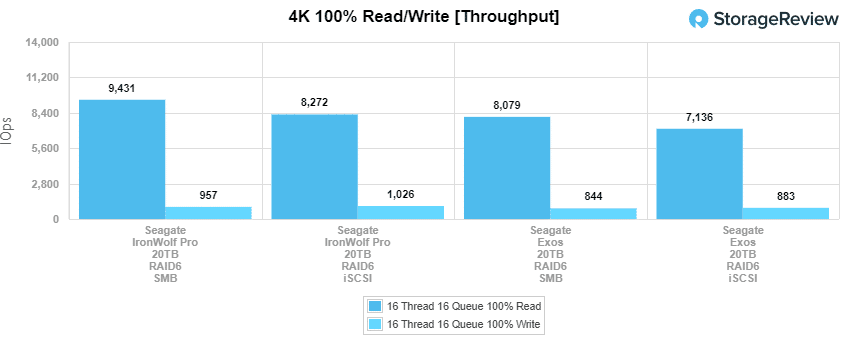
Next up is average latency. The Exos X20 continued trailing its IronWolf Pro counterpart. In SMB, the Exos X20 came in at 31.682ms in read and 303.14ms in write versus the IronWolf Pro’s 27.138ms and 267.353ms. The Exos X20 showed similar deficiencies in iSCSI testing, with 35.87ms in read and 290.195ms in write versus the IronWolf Pro’s 30.944ms and 249.437ms.
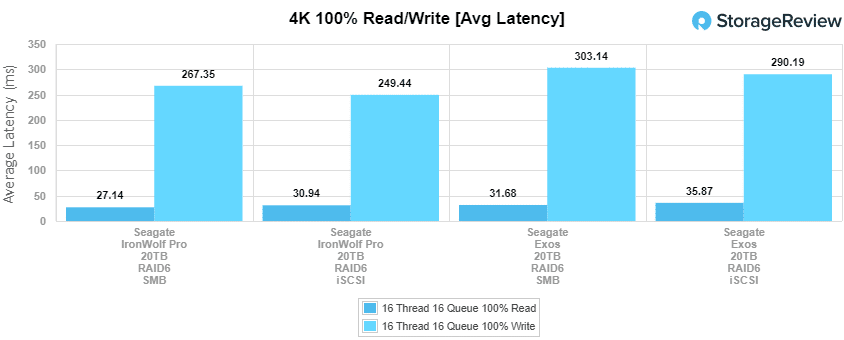
In our max latency test, the Exos X20 registered 1256.7ms read and 5471ms in write in SMB, much higher than the IronWolf Pro’s 838.503ms and 1810.2ms. The Exos X20 did slightly better in iSCSI write, with 5117.1ms compared to the IronWolf Pro’s high 13,894ms.
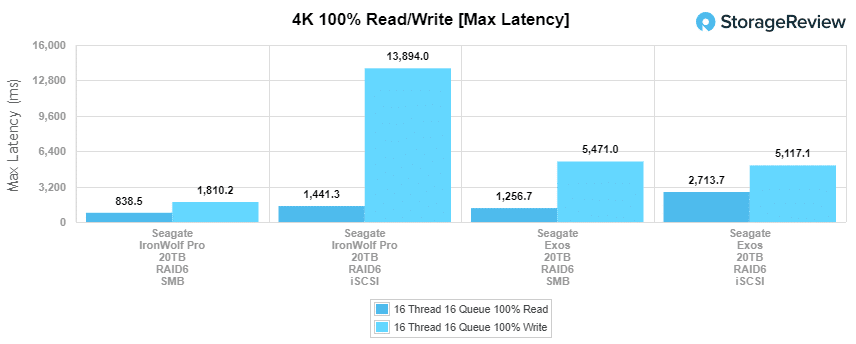
Our last 4K test is standard deviation, where prospects didn’t improve for the Exos X20. It had much higher latencies in SMB, registering 44.824ms in read and 283.2ms in write versus the IronWolf Pro’s 36.58ms and 173.743ms, though it did better in iSCSI write, at 619.692ms against the IronWolf Pro’s 743.144ms.
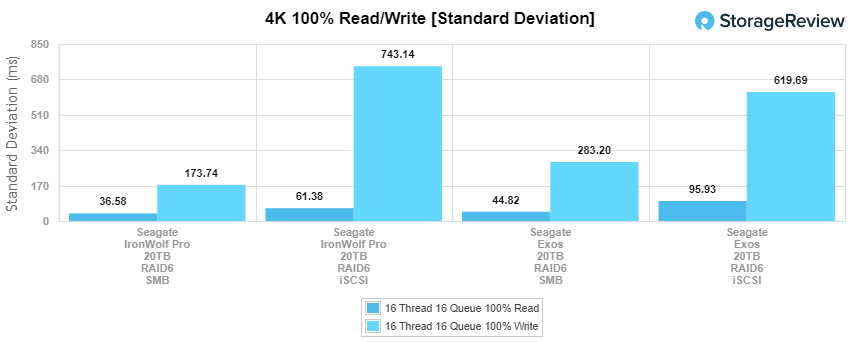
Our next benchmark subjects the drives to 100% read and write activity at 8K sequential throughput. The Exos X20 started to improve relative to the IronWolf Pro, with 54,827 IOPS read and 41,118 IOPS write in SMB, and 223,493 IOPS read and 67,124 IOPS write in iSCSI.
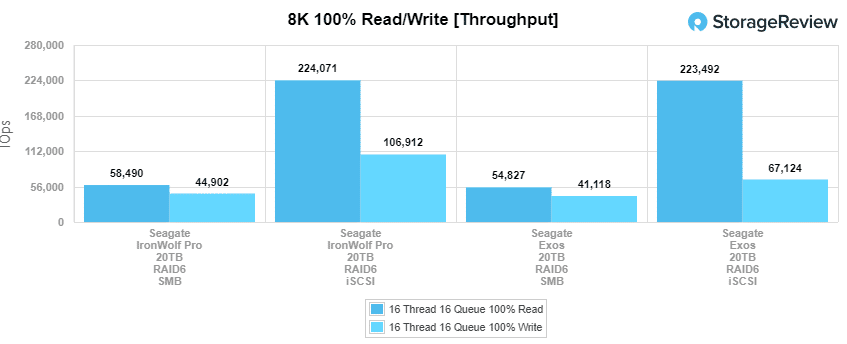
Moving on, we look at a mixed 8K 70%/30% workload to demonstrate how performance scales from 2T/2Q to 16T/16Q. The IronWolf Pro averaged about 21% better IOPS in SMB and 17% better in iSCSI than the Exos X20.
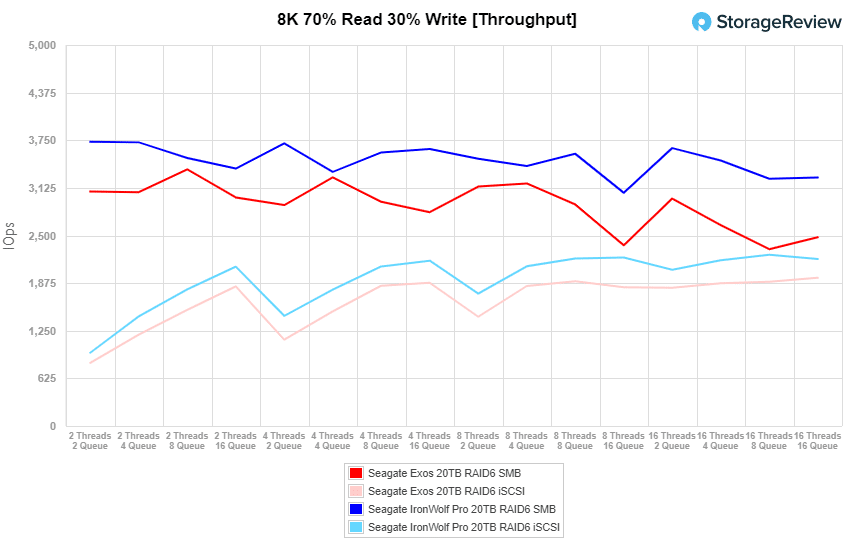
In average latency at 8K 70/30, the Exos X20 ranged from 1.29ms to 103.21ms in SMB and 4.81ms to 131.36ms in iSCSI; the IronWolf Pro had tighter ranges of 1.06ms to 78.36ms in SMB and 4.15 to 116.71ms in iSCSI.
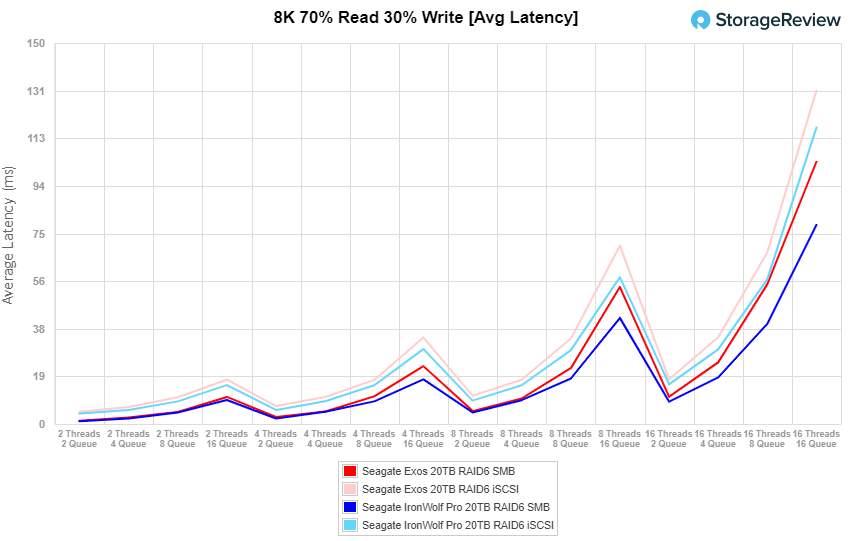
Now for the max latency numbers, where the Exos X20 remained unimpressive next to the IronWolf Pro. It ranged from 22.02ms to 3797.75ms in SMB and 345.85ms to 2085.53ms in iSCSI; the Exos X20’s ranges were 24.45ms to 981.12ms in SMB and 271.61ms to 1608.67ms in iSCSI.
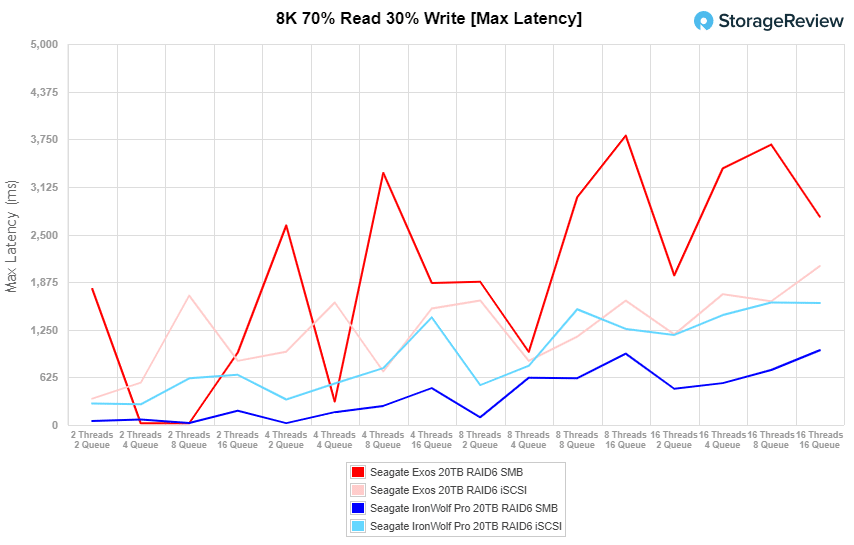
The final 8K 70/30 numbers are standard deviation. As might be expected at this point, the Exos X20 isn’t a match for the IronWolf Pro, showing almost universally higher standard deviations.
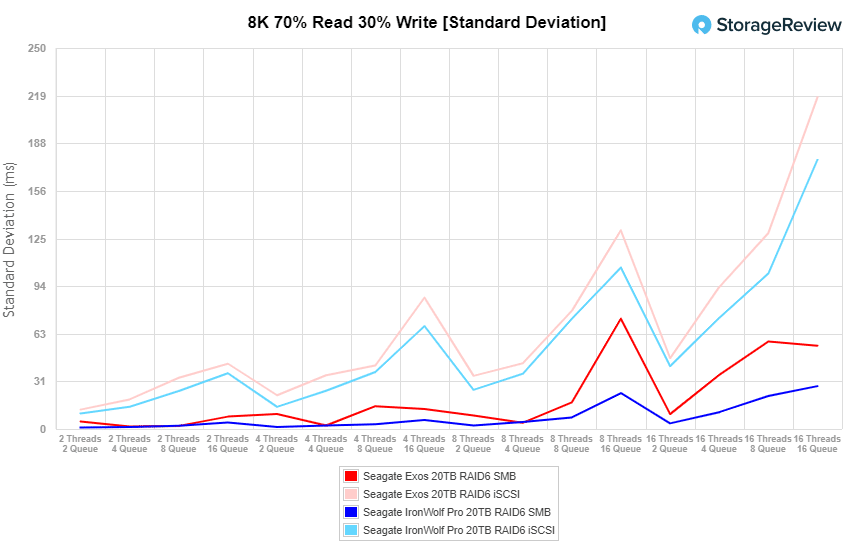
Our final benchmark is 128K read/write, a large block sequential test showing the highest sequential transfer speed. Both the Exos X20 and the IronWolf Pro achieved similar read numbers; the Exos X20 hit 2.31GB/s in SMB and 1.94GB/s in iSCSI, while the IronWolf Pro registered 2.31GB/s and 1.99GB/s. The IronWolf Pro did marginally better in write, however, achieving 1.58GB/s in SMB and 2.24GB/s in iSCSI where the Exos X20 was at 1.43GB/s and 2.10GB/s.
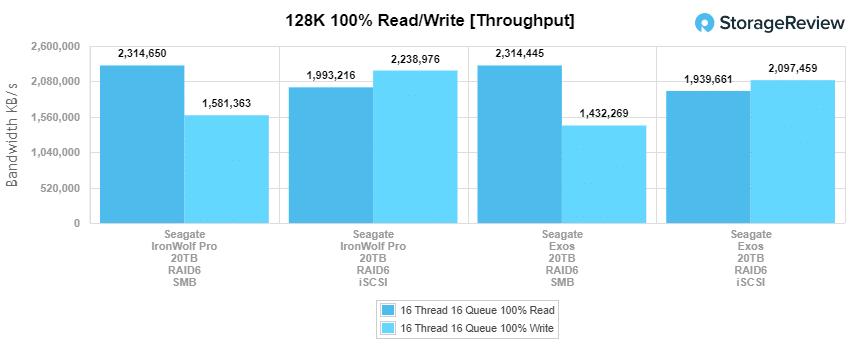
Conclusion
The Exos X20 is a welcome addition to Seagate’s enterprise hard drive lineup, offering the industry’s highest capacity in a 3.5-inch drive at 20TB. This is an improvement over the Exos X18, which maxed out at 18TB. The extra capacity adds up if you’re using many of these drives. This CMR-based drive also boasts a 2.5 million hour MTBF and is backed by a five-year warranty.
Though we had no issues running our standard benchmarks on the Exos X20 20TB, it remains a mystery why it consistently underperformed Seagate’s own IronWolf Pro 20TB, which is mechanically the same (and we expected it to behave as such). Seagate says this is due to firmware differences, though didn’t elaborate beyond saying that the Exos line is more broadly optimized than the IronWolf Pro.
Pricing is another interesting subject for the IronWolf Pro versus the Exos, where on paper the Exos has a higher MSRP, but street pricing has the Exos at a substantial discount to the IronWolf Pro. Nonetheless, the Exos X20 20TB’s high capacity, reliability ratings, and good, if not outstanding, performance are compelling reasons to consider it for your next datacenter deployment.




 Amazon
Amazon